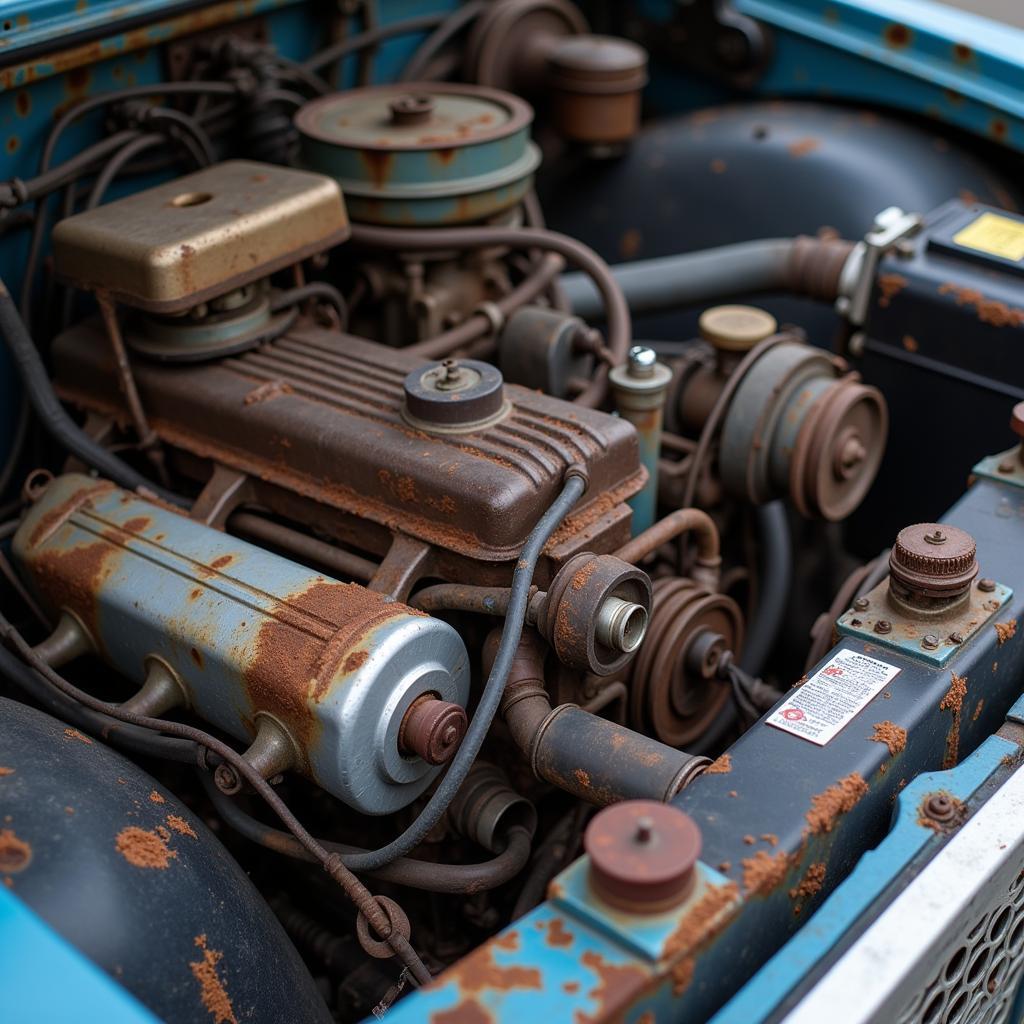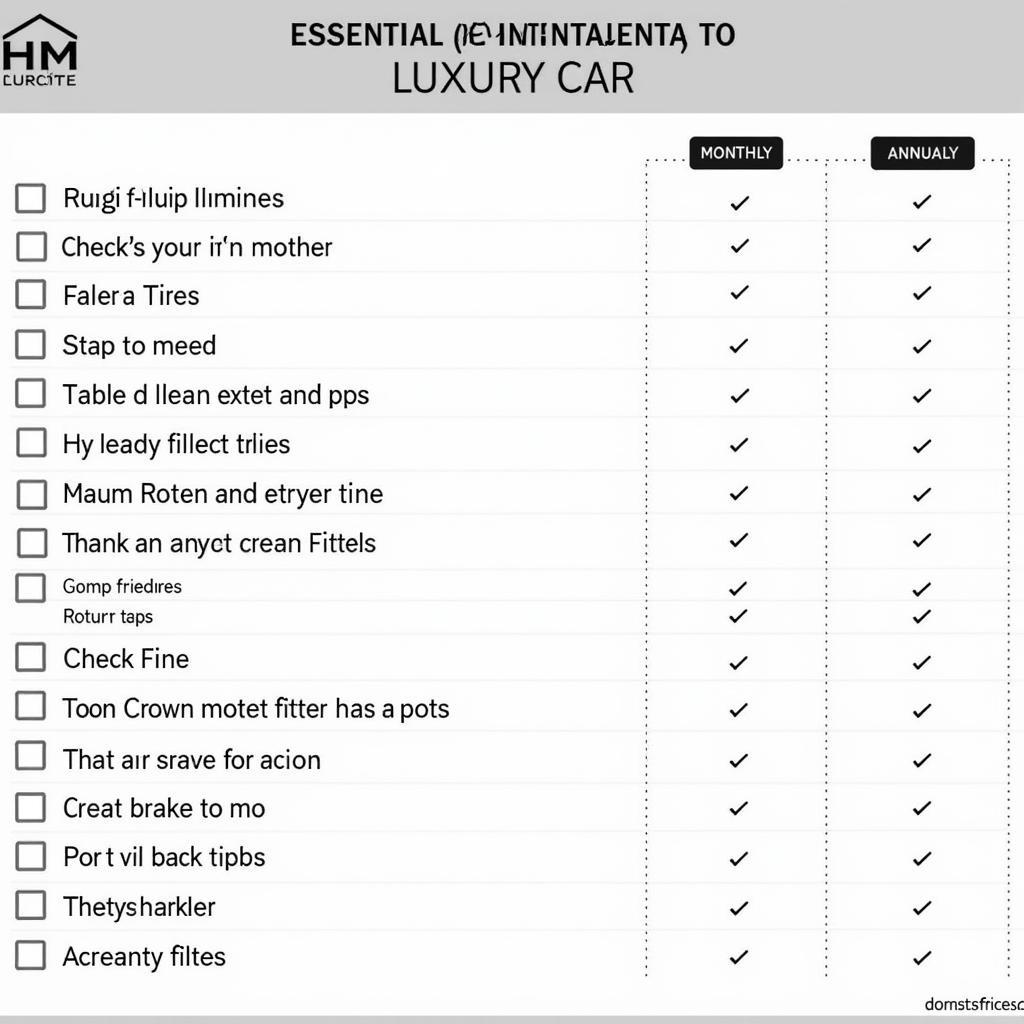Keeping your Toyota running smoothly requires consistent maintenance and proper care. Whether you’re a car owner or a mechanic, understanding the essential maintenance procedures and common issues can help you keep your Toyota on the road for years to come. This guide will provide a comprehensive overview of Toyota car maintenance, covering everything from routine checks to major repairs.
Routine Maintenance for Your Toyota
Regular maintenance is crucial for preventing problems and ensuring your Toyota’s longevity. Here’s a breakdown of essential maintenance tasks:
Oil Change
One of the most critical maintenance tasks is changing your engine oil regularly. As your car runs, the engine oil breaks down and accumulates debris. Fresh oil lubricates the engine’s moving parts, reducing friction and wear.
Toyota recommends oil changes every 5,000 miles or every 6 months, whichever comes first. You can also consult your owner’s manual for specific recommendations for your model.
Expert Tip: “It’s essential to use the correct type of oil for your Toyota. Always refer to your owner’s manual for the recommended oil viscosity and specifications.” – John Smith, Certified Toyota Technician
Air Filter Replacement
The air filter protects your engine from dirt and debris, ensuring proper airflow. A clogged air filter can restrict airflow and cause engine performance issues.
It’s recommended to replace the air filter every 12,000-15,000 miles or every 12 months.
Tire Rotation and Inspection
Rotating your tires helps to ensure even wear and extends their lifespan. It’s important to regularly check tire pressure, tread depth, and overall condition.
Toyota recommends rotating tires every 5,000-7,500 miles or every 6 months.
Expert Tip: “Inspect your tires for any signs of damage, such as cuts, bulges, or uneven wear. If you notice any problems, it’s crucial to have them addressed immediately.” – Mary Johnson, Master Mechanic
Brake Pad and Rotor Inspection
Your brake pads and rotors are critical for stopping your vehicle. Regularly inspect them for wear and tear.
Toyota recommends brake inspections every 30,000 miles.
Fluid Checks
Regularly check your car’s fluids, including:
- Coolant: Ensures proper engine temperature regulation.
- Transmission Fluid: Lubricates the transmission and ensures smooth shifting.
- Brake Fluid: Ensures proper brake function.
- Power Steering Fluid: Assists with steering.
Expert Tip: “Fluid levels should be checked regularly and topped off as needed. It’s also important to inspect the fluids for any signs of contamination.” – David Lee, Certified Toyota Mechanic
Common Toyota Car Problems
While Toyota vehicles are known for their reliability, they can still experience issues over time. Here are some common problems you might encounter:
Check Engine Light
The check engine light illuminates when your car’s computer detects a fault. This could be anything from a loose gas cap to a serious engine issue.
It’s important to diagnose the problem promptly using an OBD-II scanner.
Transmission Issues
Common transmission problems include slipping gears, rough shifting, and delayed engagement. These issues could be caused by low transmission fluid, worn-out components, or electronic malfunctions.
Electrical Problems
Electrical issues can range from minor inconveniences like a faulty light bulb to serious malfunctions like a short circuit.
If you experience electrical problems, it’s important to have your car inspected by a qualified mechanic.
Suspension Problems
A worn-out suspension can cause a variety of issues, including excessive bouncing, uneven tire wear, and handling problems.
Signs of suspension problems include clunking noises, steering wheel shake, and a bouncy ride.
Toyota Maintenance Schedule
Following a regular maintenance schedule is crucial for keeping your Toyota in top condition. Your owner’s manual will provide a detailed schedule tailored to your specific model. You can also refer to the toyota 5 years car maintenance plus for a comprehensive guide to long-term maintenance.
Here’s a general overview of a typical Toyota maintenance schedule:
Year 1:
- Oil change (every 5,000 miles or 6 months)
- Air filter replacement
- Tire rotation
- Brake inspection
Year 2:
- Oil change (every 5,000 miles or 6 months)
- Air filter replacement
- Tire rotation
- Brake inspection
- Transmission fluid check
Year 3:
- Oil change (every 5,000 miles or 6 months)
- Air filter replacement
- Tire rotation
- Brake inspection
- Transmission fluid check
- Coolant flush
Year 4:
- Oil change (every 5,000 miles or 6 months)
- Air filter replacement
- Tire rotation
- Brake inspection
- Transmission fluid check
- Coolant flush
- Spark plug replacement
Year 5:
- Oil change (every 5,000 miles or 6 months)
- Air filter replacement
- Tire rotation
- Brake inspection
- Transmission fluid check
- Coolant flush
- Spark plug replacement
- Timing belt inspection
Year 6 and Beyond:
- Continue following the maintenance schedule outlined in your owner’s manual.
Toyota Car Maintenance Tips
Here are some additional tips for keeping your Toyota running smoothly:
- Use the correct fluids: Always use the fluids specified by Toyota for your model.
- Follow the maintenance schedule: Stick to the recommended maintenance schedule for your vehicle.
- Perform regular inspections: Conduct routine inspections to catch any potential issues early.
- Address problems promptly: Don’t ignore warning lights or strange noises.
- Use quality parts: When you need to replace parts, use genuine Toyota parts or high-quality aftermarket parts.
FAQs
Q: How often should I service my Toyota?
A: Toyota recommends servicing your vehicle every 5,000 miles or every 6 months, whichever comes first. Refer to your owner’s manual for specific details.
Q: What are the common signs of a failing transmission?
A: Common signs include slipping gears, rough shifting, delayed engagement, and a whining noise.
Q: What does the check engine light mean?
A: It indicates a fault in your vehicle’s engine. You’ll need to diagnose the issue using an OBD-II scanner.
Q: How do I know if my tires need to be replaced?
A: Check the tread depth using a tread depth gauge or the penny test. If you can see the Lincoln’s head, it’s time to replace your tires.
Q: What should I do if I hear a clunking noise when driving?
A: This could be a sign of a suspension problem. You should have your car inspected by a qualified mechanic.
For expert Toyota car maintenance and repair, contact AutoTipPro. Our team of experienced mechanics provides comprehensive services for all Toyota models. Call us at +1 (641) 206-8880 or visit our office at 500 N St Mary’s St, San Antonio, TX 78205, United States.






Leave a Reply